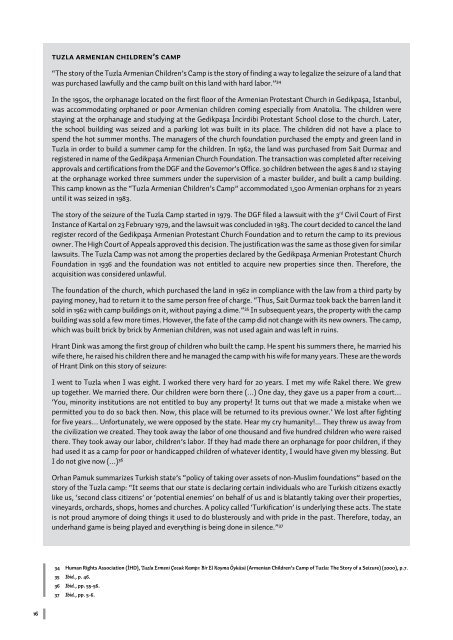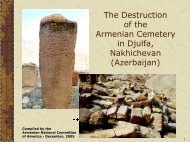The Story of an Alien(ation): - Tesev
The Story of an Alien(ation): - Tesev
The Story of an Alien(ation): - Tesev
Create successful ePaper yourself
Turn your PDF publications into a flip-book with our unique Google optimized e-Paper software.
Tuzla Armeni<strong>an</strong> Children’s Camp<br />
“<strong>The</strong> story <strong>of</strong> the Tuzla Armeni<strong>an</strong> Children’s Camp is the story <strong>of</strong> finding a way to legalize the seizure <strong>of</strong> a l<strong>an</strong>d that<br />
was purchased lawfully <strong>an</strong>d the camp built on this l<strong>an</strong>d with hard labor.” 34<br />
In the 1950s, the orph<strong>an</strong>age located on the first floor <strong>of</strong> the Armeni<strong>an</strong> Protest<strong>an</strong>t Church in Gedikpaşa, Ist<strong>an</strong>bul,<br />
was accommodating orph<strong>an</strong>ed or poor Armeni<strong>an</strong> children coming especially from Anatolia. <strong>The</strong> children were<br />
staying at the orph<strong>an</strong>age <strong>an</strong>d studying at the Gedikpaşa İncirdibi Protest<strong>an</strong>t School close to the church. Later,<br />
the school building was seized <strong>an</strong>d a parking lot was built in its place. <strong>The</strong> children did not have a place to<br />
spend the hot summer months. <strong>The</strong> m<strong>an</strong>agers <strong>of</strong> the church found<strong>ation</strong> purchased the empty <strong>an</strong>d green l<strong>an</strong>d in<br />
Tuzla in order to build a summer camp for the children. In 1962, the l<strong>an</strong>d was purchased from Sait Durmaz <strong>an</strong>d<br />
registered in name <strong>of</strong> the Gedikpaşa Armeni<strong>an</strong> Church Found<strong>ation</strong>. <strong>The</strong> tr<strong>an</strong>saction was completed after receiving<br />
approvals <strong>an</strong>d certific<strong>ation</strong>s from the DGF <strong>an</strong>d the Governor’s Office. 30 children between the ages 8 <strong>an</strong>d 12 staying<br />
at the orph<strong>an</strong>age worked three summers under the supervision <strong>of</strong> a master builder, <strong>an</strong>d built a camp building.<br />
This camp known as the “Tuzla Armeni<strong>an</strong> Children’s Camp” accommodated 1,500 Armeni<strong>an</strong> orph<strong>an</strong>s for 21 years<br />
until it was seized in 1983.<br />
<strong>The</strong> story <strong>of</strong> the seizure <strong>of</strong> the Tuzla Camp started in 1979. <strong>The</strong> DGF filed a lawsuit with the 3 rd Civil Court <strong>of</strong> First<br />
Inst<strong>an</strong>ce <strong>of</strong> Kartal on 23 February 1979, <strong>an</strong>d the lawsuit was concluded in 1983. <strong>The</strong> court decided to c<strong>an</strong>cel the l<strong>an</strong>d<br />
register record <strong>of</strong> the Gedikpaşa Armeni<strong>an</strong> Protest<strong>an</strong>t Church Found<strong>ation</strong> <strong>an</strong>d to return the camp to its previous<br />
owner. <strong>The</strong> High Court <strong>of</strong> Appeals approved this decision. <strong>The</strong> justific<strong>ation</strong> was the same as those given for similar<br />
lawsuits. <strong>The</strong> Tuzla Camp was not among the properties declared by the Gedikpaşa Armeni<strong>an</strong> Protest<strong>an</strong>t Church<br />
Found<strong>ation</strong> in 1936 <strong>an</strong>d the found<strong>ation</strong> was not entitled to acquire new properties since then. <strong>The</strong>refore, the<br />
acquisition was considered unlawful.<br />
<strong>The</strong> found<strong>ation</strong> <strong>of</strong> the church, which purchased the l<strong>an</strong>d in 1962 in compli<strong>an</strong>ce with the law from a third party by<br />
paying money, had to return it to the same person free <strong>of</strong> charge. “Thus, Sait Durmaz took back the barren l<strong>an</strong>d it<br />
sold in 1962 with camp buildings on it, without paying a dime.” 35 In subsequent years, the property with the camp<br />
building was sold a few more times. However, the fate <strong>of</strong> the camp did not ch<strong>an</strong>ge with its new owners. <strong>The</strong> camp,<br />
which was built brick by brick by Armeni<strong>an</strong> children, was not used again <strong>an</strong>d was left in ruins.<br />
Hr<strong>an</strong>t Dink was among the first group <strong>of</strong> children who built the camp. He spent his summers there, he married his<br />
wife there, he raised his children there <strong>an</strong>d he m<strong>an</strong>aged the camp with his wife for m<strong>an</strong>y years. <strong>The</strong>se are the words<br />
<strong>of</strong> Hr<strong>an</strong>t Dink on this story <strong>of</strong> seizure:<br />
I went to Tuzla when I was eight. I worked there very hard for 20 years. I met my wife Rakel there. We grew<br />
up together. We married there. Our children were born there (…) One day, they gave us a paper from a court…<br />
‘You, minority institutions are not entitled to buy <strong>an</strong>y property! It turns out that we made a mistake when we<br />
permitted you to do so back then. Now, this place will be returned to its previous owner.’ We lost after fighting<br />
for five years… Unfortunately, we were opposed by the state. Hear my cry hum<strong>an</strong>ity!... <strong>The</strong>y threw us away from<br />
the civiliz<strong>ation</strong> we created. <strong>The</strong>y took away the labor <strong>of</strong> one thous<strong>an</strong>d <strong>an</strong>d five hundred children who were raised<br />
there. <strong>The</strong>y took away our labor, children’s labor. If they had made there <strong>an</strong> orph<strong>an</strong>age for poor children, if they<br />
had used it as a camp for poor or h<strong>an</strong>dicapped children <strong>of</strong> whatever identity, I would have given my blessing. But<br />
I do not give now (…) 36<br />
Orh<strong>an</strong> Pamuk summarizes Turkish state’s “policy <strong>of</strong> taking over assets <strong>of</strong> non-Muslim found<strong>ation</strong>s” based on the<br />
story <strong>of</strong> the Tuzla camp: “It seems that our state is declaring certain individuals who are Turkish citizens exactly<br />
like us, ‘second class citizens’ or ‘potential enemies’ on behalf <strong>of</strong> us <strong>an</strong>d is blat<strong>an</strong>tly taking over their properties,<br />
vineyards, orchards, shops, homes <strong>an</strong>d churches. A policy called ‘Turkific<strong>ation</strong>’ is underlying these acts. <strong>The</strong> state<br />
is not proud <strong>an</strong>ymore <strong>of</strong> doing things it used to do blusterously <strong>an</strong>d with pride in the past. <strong>The</strong>refore, today, <strong>an</strong><br />
underh<strong>an</strong>d game is being played <strong>an</strong>d everything is being done in silence.” 37<br />
34 Hum<strong>an</strong> Rights Associ<strong>ation</strong> (İHD), Tuzla Ermeni Çocuk Kampı: Bir El Koyma Öyküsü (Armeni<strong>an</strong> Children’s Camp <strong>of</strong> Tuzla: <strong>The</strong> <strong>Story</strong> <strong>of</strong> a Seizure) (2000), p.7.<br />
35 Ibid., p. 46.<br />
36 Ibid., pp. 55-56.<br />
37 Ibid., pp. 5-6.<br />
16



